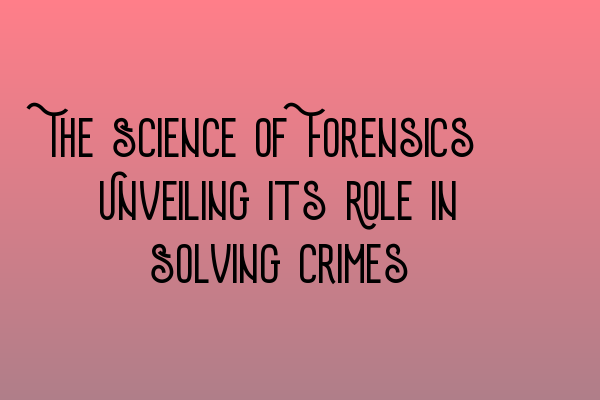The Science of Forensics: Unveiling its Role in Solving Crimes
When it comes to solving crimes, one crucial element plays a significant role in uncovering the truth: forensics. The science of forensics has revolutionized the way crimes are investigated and has become an indispensable tool for law enforcement agencies around the world. In this article, we will dive into the fascinating world of forensics and explore its vital role in solving crimes.
The Origins of Forensics
The roots of forensic science can be traced back centuries. The ancient Chinese, Egyptians, and Romans all recognized the importance of physical evidence in criminal investigations. However, it was not until the late 19th century that forensics began to evolve into a scientific discipline.
One of the pioneers of modern forensic science was Sir Arthur Conan Doyle’s iconic character, Sherlock Holmes. Although Holmes was a fictional detective, his keen eye for detail and systematic approach to solving crimes paved the way for the development of real-life forensic techniques.
The Role of Forensics in Crime Investigation
Forensic science encompasses a wide range of disciplines, each playing a crucial role in unravelling the mysteries behind crimes. Let’s explore some of the key areas where forensics comes into play:
1. DNA Analysis
Perhaps one of the most well-known and widely used forensic techniques is DNA analysis. The unique genetic code contained within our DNA can link individuals to crime scenes, victims, or even other criminals. This invaluable tool has helped solve countless cases and exonerate the innocent.
For more information on DNA analysis in criminal investigations, check out our article on SQE 1 Practice Exam Questions.
2. Fingerprint Examination
Every individual has a unique set of fingerprints, making them one of the most reliable pieces of evidence in a crime scene. Forensic experts meticulously examine fingerprints left behind at the scene to identify potential suspects and build a compelling case against them.
If you’re interested in learning more about fingerprint examination techniques, our article on SQE 1 Practice Mocks FLK1 FLK2 provides valuable insights.
3. Ballistics and Firearms Analysis
Ballistics and firearms analysis help link weapons to crimes. Experts examine bullets, shell casings, and firearms to determine if they were used in a particular crime. This information can be crucial in identifying the weapon used and potentially connecting it to a suspect.
To learn more about ballistics and firearms analysis, our article on SQE 2 Preparation Courses provides a comprehensive overview.
4. Toxicology
Toxicology plays a vital role in determining the presence of drugs or poisons in a victim’s body. Analyzing various bodily fluids and tissues, forensic toxicologists can identify substances that may have contributed to the crime or caused the victim’s death.
If you’re interested in exploring toxicology in more depth, our article on SQE 1 Preparation Courses delves into the subject further.
The Impact of Forensics on Justice
The advancements in forensic science have significantly impacted the criminal justice system. Not only does forensics help identify and convict perpetrators, but it also plays a crucial role in exonerating the innocent.
By providing undeniable scientific evidence, forensics has drastically reduced the risk of wrongful convictions and increased the overall fairness of the justice system.
The Future of Forensics
As technology continues to advance, forensic science is poised to undergo further transformation. New techniques, such as digital forensics, are already playing a crucial role in solving cybercrimes and gathering evidence from electronic devices.
With ever-changing challenges faced by law enforcement, it is vital for professionals in the field to stay updated with the latest developments in forensic science. To stay informed about SRA SQE exam dates, check out our article on SRA SQE Exam Dates.
Forensic science has undoubtedly revolutionized the way crimes are investigated and solved. Its impact on the criminal justice system cannot be overstated. By relying on scientific evidence, experts in forensics bring justice to the victims and provide closure to the families affected by crimes.
For more information on the fascinating world of forensics, stay tuned to our blog for future articles and updates.
